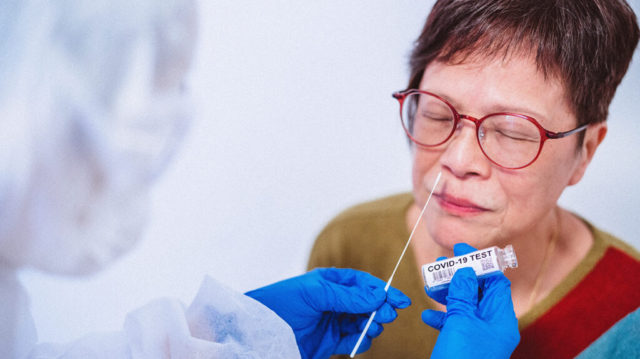When COVID cases were at their peak in America in July, nearly 75,000 new cases were reported in one day, according to the Centers for Disease Control and Prevention (CDC). Around that same time, the average number of new cases per day was about 67,000. Now, the average is at about 42,000 and has been on a steady decline for several consecutive days.
Although the country is beginning to see a decline in new COVID cases, you should still be prepared with information about how Medicare will cover COVID-related medical services.
How Medicare covers COVID-19 diagnostic and antibody tests
Medicare Part B covers your outpatient medical services, such as doctor visits, lab work, and diagnostic tests. The COVID-19 diagnostic test is also covered under Medicare Part B. Generally, Part B covers 80% of approved charges, while you pay 20%. However, Part B currently covers diagnostic tests for COVID-19 at 100%.
Medicare covers the test whether you get it in a doctor’s office, a lab setting, or at home by a home health professional.
If you have Medicare Advantage, your plan isn’t allowed to charge you any cost-sharing amounts for COVID-19 tests.
COVID-19 antibody tests
In addition to the test to check if you currently have COVID-19, there is also a test to check for COVID-19 antibodies that confirm you had the disease in the past. The FDA approved this test to see which people have developed an immune response to COVID-19. The COVID-19 antibody tests are also covered at 100% by Part B, and they, too, can be done at your home.
How Medicare covers COVID-19 treatment
If you test positive for COVID-19, you can rest assured knowing that Medicare will cover your treatment just like it would for most other illnesses. As mentioned earlier, Part B covers 80% of your medically necessary outpatient services. You will be responsible for the other 20%, as well as your Part B annual deductible. However, if you have a Medigap plan, it likely covers your Part B 20% coinsurance, leaving you with only the deductible.
Part B also covers emergency room visits and observation stays at the hospital. For example, if you go to the emergency room with a fever, your doctor may want to keep you overnight for observation. In this case, you haven’t been officially admitted, so Part B l covers your overnight stay.
Inpatient treatment
On the other hand, if you are admitted as an inpatient, Medicare Part A will cover your stay. As an inpatient, Medicare Part A covers your room, meals, and most drugs administered to you during your stay. However, you will have cost-sharing expenses under Part A just like you do under Part B.
You will owe your Part A deductible, which as of 2020, is over $1,400 and covers your first 60 days in the hospital. The Part A deductible is per benefit period, so you could owe it multiple times a year. Fortunately, most Medigap plans cover the Part A deductible.
How Medicare will cover a future COVID-19 vaccine
Currently, there is not an FDA-approved COVID-19. However, if one is approved, the Centers for Medicare and Medicaid Services (CMS) has stated that all Part D plans will be required to cover it. Medicare Part B, which covers some vaccines, will not cover the COVID-19 vaccine;.
Even though Medicare covers treatment for COVID-19,you should continue to practice social distance and take precautions recommended by the CDC..








